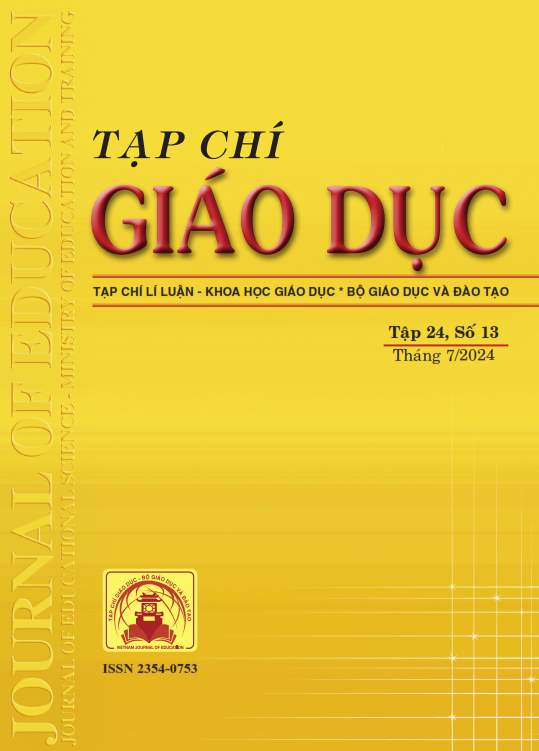Cảm nhận hạnh phúc của sinh viên: nghiên cứu tại một số trường đại học ở Thành phố Hồ Chí Minh
Tóm tắt
Psychological Well-being is a life value that each person pursues with different criteria. For students, psychological well-being is very important, helping them promote creativity, positivity, and initiative in life and study, creating favorable conditions for students' social relationships. This article presents survey results on the psychological well-being status of students at several universities in Ho Chi Minh City through students' self-assessment using Ryff’s Psychological Well-Being Scales (RPWB), which serves as a scientific and practical basis to help students increase their ability to feel happiness.
Tài liệu tham khảo
Bùi Ngọc Diệp, Lê Minh Châu, Trần Thị Tố Oanh, Phạm Thị Thu Phương, Nguyễn Dục Quang, Lê Thanh Sử, Lưu Thu Thuỷ, Đào Vân Vi (2010). Giáo dục kĩ năng sống trong hoạt động ngoài giờ lên lớp ở trường trung học phổ thông. NXB Giáo dục Việt Nam.
Casas, F., Bello, A., González, M., & Aligué, M. (2013). Children’s Subjective Well Being Measured Using a Composite Index: What Impacts Spanish First-Year Secondary Education Students’ Subjective Well-Being? Child Indicators Research, 6, 433-460.
Hồ Văn Dũng (2022). Cảm nhận hạnh phúc của sinh viên Trường Đại học Sư phạm - Đại học Huế. Tạp chí Giáo dục, 22(3), 59-64.
Lyubomirsky, S., King, L., & Diener, E. (2005). The benefits of frequent positive affect: Does happiness lead to success? Psychological Bulletin, 131(6), 803- 855. https://doi.org/10.1037/0033-2909.131.6.803
Mạc Văn Trang (2011). Giáo dục giá trị sống cho học sinh phổ thông hiện nay. Kỉ yếu hội thảo khoa học “Nghiên cứu Giáo dục giá trị sống cho học sinh tiểu học trong giai đoạn hiện nay”. Hội Khoa học Tâm lí Giáo dục Hà Nội, tr 28-39.
Morgan, R. (2014). The Children’s Happiness Scale. Ofsted raising standards improving lives. https://assets.publishing.service.gov.uk/government/uploads/system/uploads/attachment_data/file/379265/The_20Children_27s_20Happiness_20Scale.pdf
Phạm Minh Hạc (2012). Giá trị học - cơ sở lí luận góp phần đúc kết, xây dựng giá trị chung của người Việt Nam thời nay. NXB Dân trí.
Phan Thị Mai Hương (2014). Cảm nhận hạnh phúc của người nông dân. Tạp chí Tâm lí học, 8, 28-40.
Ryff, C. D. (2007). Ryff’s Psychological Well-Being Scales. https://journals.plos.org/plosone/article/file?type= supplementary&id=info:doi/10.1371/journal.pone.0208143.s002
Ryff, C. D., & Keyes, C. L. M. (1995). The structure of psychological wellbeing revisited. Journal of Personality and Social Psychology, 69(4), 719-727. https://doi.org/10.1037/0022-3514.69.4.719
Ryff, C. D., & Singer, B. (1996). Psychological Well-Being: Meaning, Measurement, and Implications for Psychotherapy Research. Psychother Psychosom, 65(1), 14-23. https://doi.org/10.1159/000289026
Tillman, D. (2008). Living value activities for young adults. Health communications, InC; deerfield Beach, Florida, USA.
Tillman, D. (2010). Những giá trị sống cho tuổi trẻ. NXB Tổng hợp Thành phố Hồ Chí Minh.
Tillman, D., & Diana Hsu (2010). Những giá trị sống trong giáo dục con trẻ. NXB Tổng hợp Thành phố Hồ Chí Minh.
Tải xuống
Đã Xuất bản
Cách trích dẫn
Số
Chuyên mục
Giấy phép

Tác phẩm này được cấp phép theo Ghi nhận tác giả của Creative Commons Giấy phép quốc tế 4.0 .












